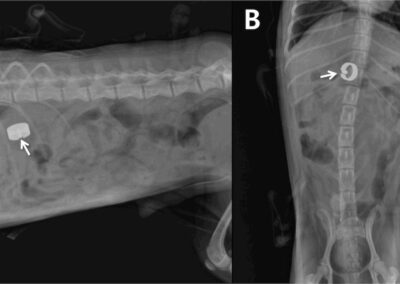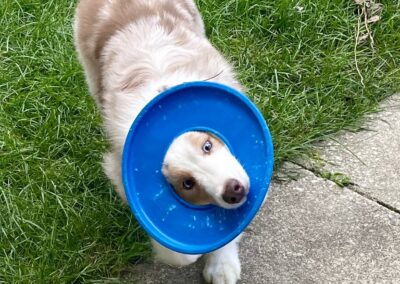
What is Canine Acupuncture?
Acupuncture, a key component of traditional Chinese medicine, has been practiced for thousands of years in human medicine. In recent decades, its application has extended to veterinary care. This ancient practice involves the insertion of fine needles into specific points on the body to stimulate healing and alleviate various health conditions. As a holistic treatment, canine acupuncture seeks to promote the body’s natural healing processes, offering an alternative or complementary option to conventional veterinary treatments.
Acupuncture operates on the principle that the body has energy channels, or meridians, through which life energy, known as “Qi” (pronounced “chee”), flows. When this energy flow is disrupted, it can lead to illness or discomfort. Acupuncture aims to restore the balance and flow of Qi, thereby promoting health and well-being.
In a typical acupuncture session, a certified veterinary acupuncturist inserts thin, sterile needles into specific acupuncture points on the pet’s body. These points are believed to correspond with various organs and systems. The insertion of the needles is usually painless and well-tolerated by most pets, with some even appearing relaxed or sleepy during the treatment.
Conditions Treated by Canine Acupuncture
Arthritis and Joint Pain:
One of the most common uses of acupuncture in dogs is to manage arthritis and joint pain. As pets age, they may develop osteoarthritis, which can cause significant discomfort and reduce mobility. Acupuncture can help alleviate pain and inflammation, improving the dog’s quality of life.
Chronic Pain
Beyond arthritis, acupuncture is effective in treating various forms of chronic pain. This includes conditions like intervertebral disc disease (IVDD) and hip dysplasia. By stimulating the body’s natural pain-relieving mechanisms, acupuncture can provide relief without the side effects often associated with long-term use of pain medications.
Neurological Disorders
Acupuncture can be beneficial for dogs with neurological issues, including seizures and certain types of paralysis. For example, dogs recovering from spinal injuries or those with degenerative myelopathy may experience improved nerve function and muscle strength with regular acupuncture sessions.
Benefits of Canine Acupuncture
Non-Invasive: Acupuncture is a non-surgical, drug-free treatment option that can complement other therapies.
Minimal Side Effects: When performed by a qualified professional, acupuncture has few side effects, making it a safe option for many dogs.
Holistic Approach: Acupuncture addresses the root causes of health issues rather than just treating symptoms, promoting overall well-being.
Limitations of Canine Acupuncture
Not a Cure-All: While acupuncture can be effective for many conditions, it is not a cure-all. It works best as part of an integrated approach to veterinary care.
Requires Multiple Sessions: Some conditions may require multiple acupuncture sessions before significant improvement is seen. This can be time-consuming and may require a financial commitment.
Variable Results: The effectiveness of acupuncture can vary from dog to dog. While some dogs respond remarkably well, others may see only minimal improvement.
Conclusion
Acupuncture offers a promising alternative or complementary treatment for various health conditions, from arthritis to chronic pain, and gastrointestinal to neurological disorders. By promoting the body’s natural healing processes, acupuncture can improve the quality of life for many dogs. However, it is essential to recognize its limitations and understand that it is not a standalone cure. As with any medical treatment, it is crucial to consult with a qualified veterinary professional to determine the best care plan for your furry friend. Through a balanced approach that integrates both conventional and holistic therapies, we can help ensure our dogs live happier, healthier lives.


 Barks & Recreation is proud to feature Dr. Eileen Savier CVA, CVCH as our Veterinary Blogger in our “From the Vet” Series — offering information related to the health and welfare of your furry family members! Currently part of the team of doctors at Keystone Veterinary Clinic, Dr. Savier is a 2012 Graduate of the Ross University School of Veterinary Medicine, She completed her clinical experience at The Ohio State University and after veterinary school she pursued further education and certification in Veterinary Acupuncture, Chinese Herbal Medicine, and Fear Free veterinary visits. Dr. Savier has a special interest in integrative medicine, animal behavior, and internal medicine and is committed to improving animal health care by integrating Eastern and Western philosophies. She enjoys working with fearful & aggressive dogs and cats and she has had additional training in low stress handling techniques and encourages positive reinforcement during exams and procedures. Her clinical interests include pain management, animal behavior, geriatric patient care, and internal medicine.
Barks & Recreation is proud to feature Dr. Eileen Savier CVA, CVCH as our Veterinary Blogger in our “From the Vet” Series — offering information related to the health and welfare of your furry family members! Currently part of the team of doctors at Keystone Veterinary Clinic, Dr. Savier is a 2012 Graduate of the Ross University School of Veterinary Medicine, She completed her clinical experience at The Ohio State University and after veterinary school she pursued further education and certification in Veterinary Acupuncture, Chinese Herbal Medicine, and Fear Free veterinary visits. Dr. Savier has a special interest in integrative medicine, animal behavior, and internal medicine and is committed to improving animal health care by integrating Eastern and Western philosophies. She enjoys working with fearful & aggressive dogs and cats and she has had additional training in low stress handling techniques and encourages positive reinforcement during exams and procedures. Her clinical interests include pain management, animal behavior, geriatric patient care, and internal medicine. Dr. Savier shares her home with two (soon to be three) dogs, two cats, and a toddler. She lovingly refers to her two dogs as Coconut Retrievers as they were rescue dogs she brought home from the island of St. Kitts. In her free time she enjoys spending time with her family, going to the beach, and planning her next Disney vacation.
Dr. Savier shares her home with two (soon to be three) dogs, two cats, and a toddler. She lovingly refers to her two dogs as Coconut Retrievers as they were rescue dogs she brought home from the island of St. Kitts. In her free time she enjoys spending time with her family, going to the beach, and planning her next Disney vacation.




